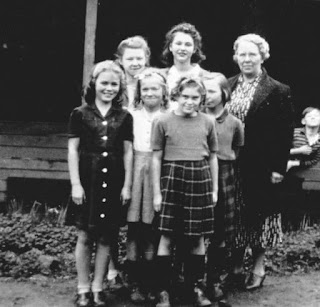Our first teacher was ninety years old. I think maybe she wore a wig, but she'd push her glasses up on her head and then forget they were there and go around looking for them. Sometimes she'd fall asleep in class. Then we older students would help her so things wouldn't get too wild.
There were two brothers, Leo and Haskell McInturf who were real ornery. Haskell used to peek at us when we were in the outhouse. It was kept clean with disinfectant, but there were holes where the knots had fallen out of the wood. I took can lids out one day, nailed them over the holes, and said, "There! Now you won't be doing any more peeping." They were younger than me, and I was one of the three eighth grade girls that helped teach them.
 |
| CSU Archive. Leo & Haskell far left and right. My uncle, 2nd from the right. (Link to full photo.) |
Leo and Haskell's dad was a miner at the Lucky 7 mine. They didn't pay much for such dangerous work. My dad worked there, too. Once there was a cave-in, and we went up to the mine and waited to see if they'd get out. They finally did, and my dad said, "I'm never going down in that hole again," and he didn't.
Us kids would come over the mountain to the school sometimes when we couldn't get a ride. I'd wear my jeans and my clodhoppers when I'd do that. That's what we called those big-soled shoes. Anyway, the McInturf boys bought their dad a house when he was old. That was the nicest thing. They also donated land that was used to build a senior citizen center after they passed away. Haskell, you know, went on to be a wood shop teacher at Oroville High. Both you and your brother had him.
After my first teacher retired, we got Mrs. Mooney. She was a no-nonsense teacher but cared for her students. She had a new car and would sometimes give the kids rides. "No, just sit there and don't move," she'd say. She didn't want that car getting messed up. Mrs. Mooney didn't dress sexy or anything like that. They didn't pay teachers much back then. She was just a regular person and a good teacher. Later she had kids. They wouldn't let a teacher teach if she was pregnant. Things were a lot different back then.
 |
| CSU Archive. Mrs. Mooney far right. |
My cousin Mary didn't want to give the graduating speech and neither did the other girl, so Miss Mooney said, "Betty, you're going to give the speech." I knew how to make an outline, and I did the speech on conservation, on conserving nature in the area around the river and mountain and school. You two boys gave speeches, too, when you graduated. Everybody clapped and cheered when I finished. My mom said, "I didn't know you could do that."
When I went to high school, it was such a pretty building. It was so big, though. I had a hard time because I couldn't see well. I had glasses that were thick like the ends of Coke bottles and with leather on the sides. Some of the teachers would help me and some wouldn't. Mr. Nesbit, the principal, went around to all the teachers and told them that I had to have my assignments written out big so that I could see. Some wouldn't do it. They didn't do so much for kids who had difficulties back then. My cousin Mary said, "If they won't do it, then I will," and she took notes for me and wrote on the blackboard for me.
When I graduated in 1944, there should have been about two hundred students, but there were only about seventy because all the boys had gone to war. We graduated at the State Theater, and I was worried about climbing the steps to get my diploma. I wanted to do it by myself, though, and I did. When I got my diploma, Mr. Nesbit hugged me and told the audience, "Betty can't see very well, but she's a good student and a fighter." He was a nice man and cared for his students.
After I graduated, Mom didn't want me to work because of my eyes. My aunts were nurses, though, and I talked to them and they helped me. Then I went to the county hospital and applied for a job as a Practical Nurse. On my first day of work, I dressed and Mom said, "What are you doing?" I told her, "I've got a job," and that was that.
 |
| CSU Archive. Butte County Hospital when new. |
I grew up being blind for a time and then not seeing well for my whole life. Now I can't see again. I can't hear so well, either. I spent my whole life not giving up, though, and that's helping me now. It's like Mr. Nesbit said--I'm a fighter. Just because you're quiet doesn't mean you're weak, and just because you're loud doesn't mean you're strong. Silent waters run deep.
Copyright 2013 by Thomas L. Kepler, all rights reserved

I'm curious. Do you tape your mom speaking and then type it up? I just love reading her memories. Hope there are many more.
ReplyDeleteI listen very carefully. Sometimes there are a half dozen moments over days that we discuss a topic. Then I listen very carefully again to my memory and weave the information into a single narration. My short story "Who Listens to Dragons" was written like that, only I listened to a fictional character talking to me. This piece has the added pleasure of listening to my mom's voice. Good question.
Delete